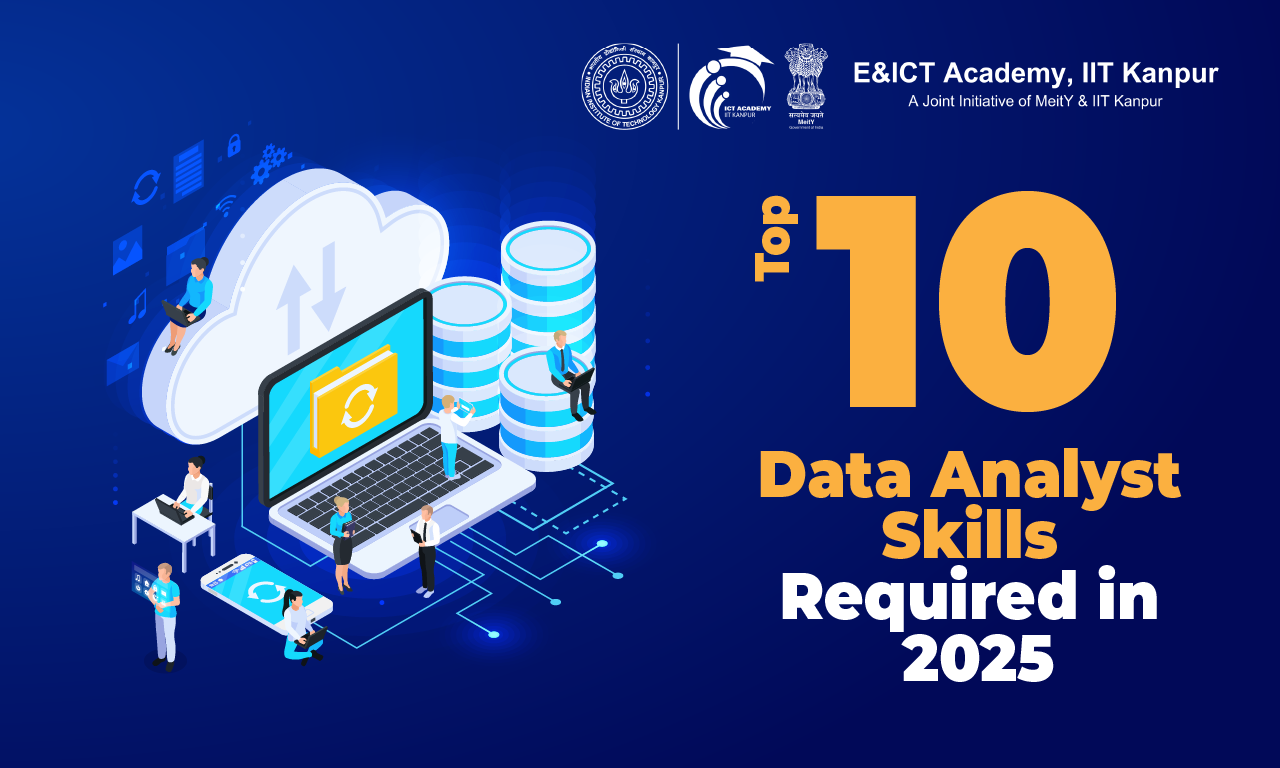Top 10 Data Analyst Skills Required in 2026

The domain of data analysis has mustered substantial traction in the past decades. This is because the strategy of better decision-making is allowed by efficiently assessing dataset inputs. In simple terms, data analysis can be understood as interpreting complex datasets and using those valuable insights to make informed decisions.
The analyzed data points are further used for various purposes like enhancing productivity, improving customer experience, and reducing potential risks. According to the latest report by the World Economic Forum, the job of data analysts, BI, and AI machine specialists is high in demand. Such a report highlights the growing importance and scope of data analysts in the coming future.
This article takes you on a quick tour of various data analyst techniques, tools and skills required to flourish in the field of data analysis.
Top Data Analyst Course 2026
With the growing demand for data analysts in 2026, having the right skills is crucial to staying competitive in the industry. While self-learning is valuable, enrolling in a high-quality data analyst course ensures structured learning, hands-on experience, and exposure to real-world projects.
A well-designed course not only helps you master key skills like SQL, Python, machine learning, and data visualization but also prepares you for industry challenges with expert mentorship and career guidance.
Whether you’re a beginner or an experienced professional looking to upskill, choosing the right course can accelerate your career growth and enhance job prospects in top companies.
Data Analytics Essentials: Enroll Today
Predictive Business Analytics for Decision Making: Enroll Today
Top 10 Skills for Data Analysts in 2026
People should concentrate on honing the following data analyst skills needed to be ready for a prosperous profession in 2026:
1. SQL & NoSQL Skills
SQL (Structured Query Language) proficiency is a must for any data analyst. SQL allows analysts to efficiently query and operate on structured data. Data analyst skills include the use of SQL to communicate with databases. SQL is a crucial tool for extracting, transforming, and loading (ETL) data, which is a substantial process in business intelligence and data warehousing.
Analysts who have a good understanding of SQL can craft complex queries to fetch specific data subsets, join multiple tables, and group data to create summary statistics. Also, with the increasing use of a multitude of data storage mechanisms by more and more companies, being familiar with NoSQL databases such as MongoDB is beneficial. Analysts can work efficiently with multiple formats of data by understanding both categories of databases well.
Must Read: How to Become Data Analyst in 2026
2. Programming Languages (Python, R)
Two computer languages that are essential for data processing and statistical analysis are Python, and R. These are some of the data analysts technical skills required. Python is easy to learn and may be used for a variety of tasks, including data analysis and web and software development. Python is a strong choice for various data analysis tasks because of its numerous libraries (such as Pandas, NumPy, and Scikit-Learn). These libraries support strong functionality in creating machine learning models, data manipulation, and numerical computations.
R is a standard in research projects because of its applicability to statistical modeling and visualization. R’s emphasis on statistics supports it as an ideal tool for statistical computations, and its ability to do visualizations makes it an ideal language for generating interesting visuals like graphs and scatter plots.
3. Statistical Analysis
Statistical Analysis is one of the most crucial skills required for a data analyst. Data interpretation requires a strong understanding of statistical methods. Numerous techniques in statistical analysis help analysts identify patterns and relationships in data. Among the most crucial methods are descriptive statistics, which describe data using metrics like mean and standard deviation; inferential statistics, which enable sample-to-population inference; and predictive analytics, which forecasts future trends based on historical data.
4. Machine Learning
Knowing this domain is necessary since organizations employ machine learning algorithms increasingly to obtain insights from information. The development of algorithms capable of learning from information without programming in advance so that they can make predictions or decisions is referred to as machine learning. The prediction models that can affect the company strategy can be constructed by analysts due to familiarity with supervised and unsupervised learning techniques.
Also Learn: What is Predictive Analytics
Though unsupervised learning deals with finding patterns within unlabeled data, supervised learning uses labeled data to train the models for predictions. Familiarity with frameworks like TensorFlow or Scikit-learn can make analysts more proficient in this activity.
5. Data Visualisation
Arguably the most essential skill of any data analyst is that of visualization of data. Analysts have the ability to build interactive dashboards that represent complex information simply and concisely with software like Tableau and Power BI. Raw data can be visualized to develop compelling stories and drive actionable information.
6. Business Intelligence
Knowledge of business intelligence technologies is essential for data analysts who wish to provide strategic insights. If analysts are familiar with tools like Microsoft Power BI or QlikView, they may combine data from many sources to create reports that support data-driven choices. Businesses can use BI tools to track performance metrics in real-time.
7. Data Warehousing
Data analysts who want to contribute strategic insights must know business intelligence tools. Analysts can offer reports in favor of sound decision-making by bringing information from different sources together when they comprehend technologies such as Microsoft Power BI or QlikView. Businesses can monitor performance indicators in real-time with the help of BI technologies.
Also Read: Important Excel for Data Analysis
8.Data Wrangling
Understanding the concepts of data warehousing becomes more important as businesses want to compile their data for analysis. Clean, well-formatted datasets can be made available to analysts for them to conduct their research if they understand how to develop and maintain data warehouses. This skill is especially valuable as businesses keep on gathering tremendous amounts of data.
9. Econometrics Skills
One of the leading qualifications for data analysts includes a good understanding of basic economics. Econometrics provides experts in the economics and finance disciplines with the tools necessary to apply statistical methods to examine economic relationships. Economists who are well-versed in econometric methods can efficiently model economic activity and predict market trends.
Also Read: Data Analytics Applications
10. Communication and Presentation Skills
Finally, communicating findings successfully to stakeholders involves excellent communication abilities. Technical lingo that is complex needs to be explained by analysts into actionable information that technical people can understand. This involves presenting their findings convincingly and crafting compelling stories around their analyses.
Conclusion
The world of data analysis keeps changing at a very fast rate as 2026 is drawing near. The above list of the most essential data analyst skills to learn reflects how the industry is getting more advanced and the greater need for individuals with the capability to effectively implement data. As new methods and tools keep arising, it is vital to keep learning and developing.
Aspiring data analysts can attain a successful career in this fast-paced industry through the effort of learning these technical skills. You can remain competitive in this fast-moving industry by keeping current with industry advances, whether formally through a data analytics course or informally through online resources.
In summary, mastering these data analyst skills will enhance your employability and help you make a huge difference in your company by transforming raw data into insights that can be used to drive business success.



